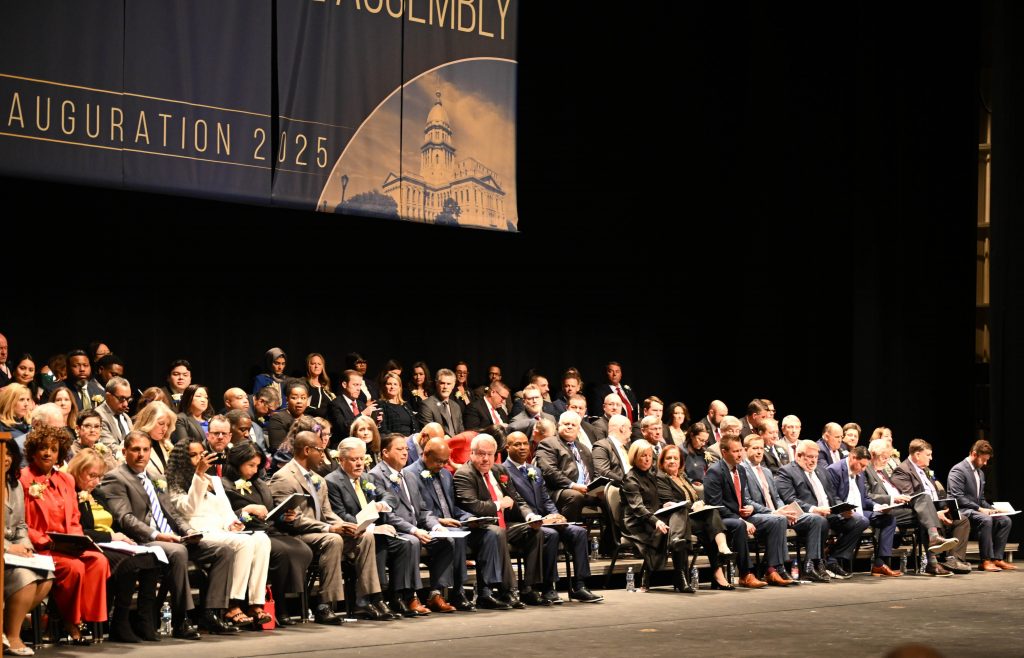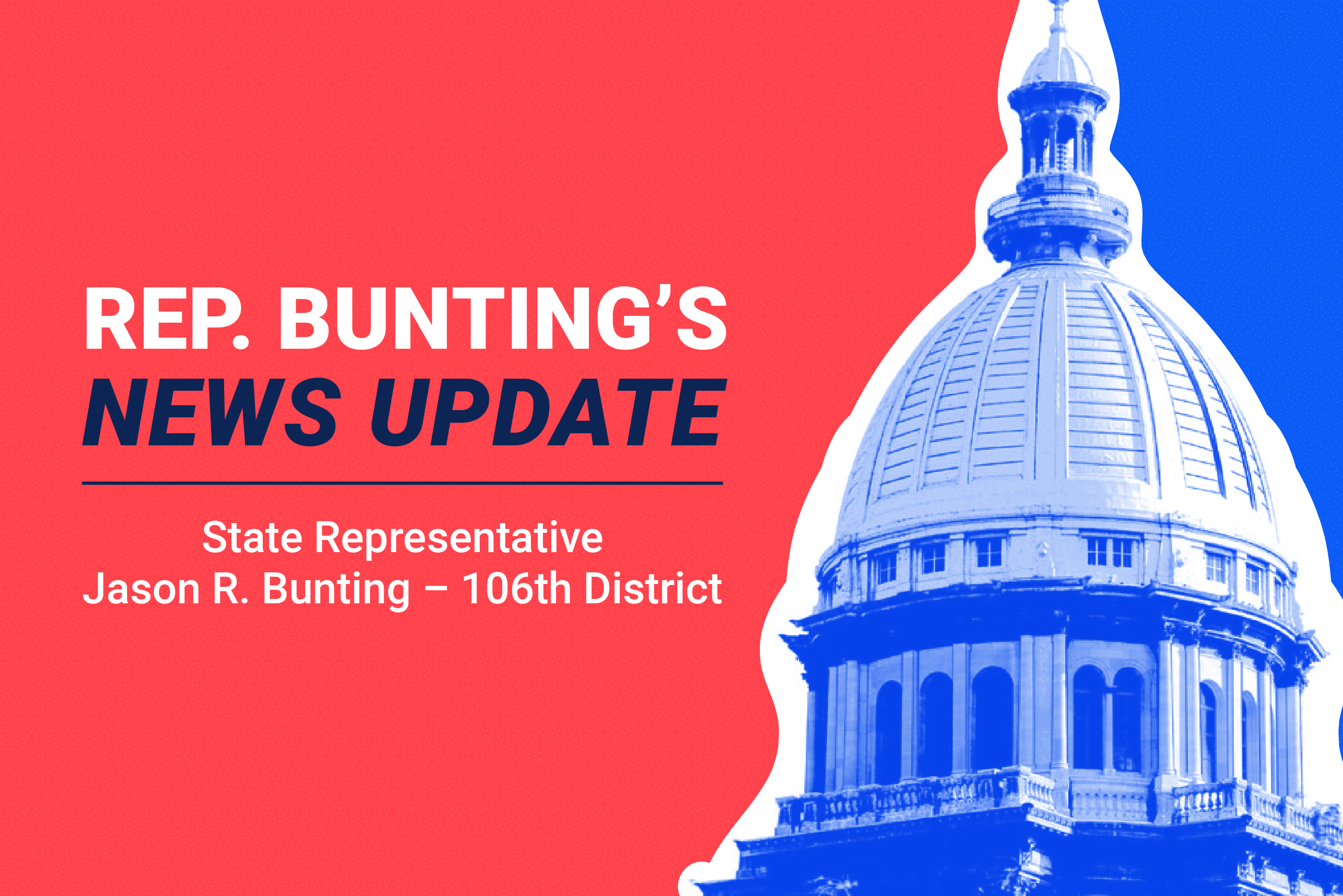In this issue:
- Inauguration Day
- Some big issues facing Illinois
- House rules once again centralize power in a few hands
- Lame duck session
Inauguration Day
It was a great honor to stand with my colleagues from all over the state on Wednesday and take the oath of office for the new 104th General Assembly.
I am grateful for the opportunity to serve the people of our district as your representative in Springfield. We will have a lot of challenges ahead in the next two years, but I am confident that if we are willing to work together in good faith we can find solutions to many of them.
The House will have a 78-40 Democrat supermajority for the next two years, the exact same numbers as we had in the last term. Representative Chris Welch of Hillside was chosen as Speaker, his third term in the post. Representative Tony McCombie of Savanna will be the Republican leader for a second term.

Over the next few weeks members will be drafting and filing bills, and the leaders of each party caucus will begin naming members to the House’s many committees. The first big event on the session calendar this year will be the Governor’s State of the State Address on February 19.
I am looking forward to getting to work in Springfield. Please get in touch with me to share your thoughts, ideas, comments and questions as session gets moving.
Some big issues facing Illinois
Though we have just convened the spring session it is already clear that we are going to have to address some big issues before our scheduled adjournment date of May 31.
The Governor’s budget office projected a deficit of more than $3 billion for the upcoming fiscal year, which starts on July 1. State spending has grown from $40 billion in 2020 to over $53 billion last year. This year we are going to have to make some tough decisions and find ways to balance the budget without raising taxes.
We are going to have to pass legislation to clean up the ethical climate in Springfield, as the latest high-profile corruption trial demonstrates. This issue has been pushed to the back burner for too long. It is time to act.
The state is also facing an ongoing out-migration crisis, as we continue to see people moving out of state and taking jobs and opportunities with them. A recent survey from U-Haul found Illinois once again at the wrong end of their list of states which people are moving to. While low-tax states like South Carolina, Texas and Florida were near the top, we were near the bottom with such high-tax states as New Jersey, California and Massachusetts. We can start improving the state’s appeal to residents and job creators by reforming our property tax and estate tax systems.
These are just some of the major issues we will need to address this spring. It is going to be an interesting few months at the Capitol.
House rules once again centralize power in a few hands
There are 118 members of the Illinois House of Representatives, but less than 24 hours after we were sworn in, the House voted along partisan lines to adopt rules which centralize power in only a few hands. Republicans proposed eleven separate amendments that would have made the House rules more fair and the process more transparent. All were ignored.
The rules which will govern the operations of the House for the next two years are virtually unchanged from those we worked with over the past two years. Those rules allowed the majority party to block Republican-sponsored bills from receiving committee hearings or votes, allowed a budget to be rammed through in the middle of the night, and even contained a provision allowing the House to vote to suspend the rules and pass a tax increase bill which had already been voted down twice.
Republicans have proposed bills to reform property taxes and estate taxes, improve the ethics climate, extend the Invest in Kids scholarship program and much more. But the House rules made it possible for our bills to be blocked and never receive proper consideration. I’m afraid this means that we can expect to see more of the same in the next two years.
This is not a good start to the new 104th General Assembly.
Lame duck session
The term “lame duck session” refers to meetings of the legislature held during the brief window of time between the election and the swearing-in of newly elected members. It is a time when outgoing members are still in office but are unaccountable to the people.
In the last decade or so it has also meant a time when legislators meet in Springfield to rush through controversial legislation with support from members who are about to head for the door. This time period has seen such bad legislation as a tax hike, the elimination of cash bail, a big spending bill, the gun ban and a legislative pay raise.
This year didn’t see quite that level of controversy, but there were some notable bills rushed through at the last minute. Included were a bill to allow secretive name changes, a gun bill with serious due process concerns, and a bill to transfer ownership of a state park. I voted No, but the bills passed anyway on the last day of the outgoing General Assembly. Many of the challenges I listed above were left unaddressed. We will have to do better in the new session.
Our current bill backlog
When a vendor provides the state with goods and services, they submit the bill to the Illinois Comptroller for payment. The Comptroller processes the paperwork and pays the bill when funds are available in the state’s checking account. Currently the total amount of unpaid bills is $1,941,227,351. This figure changes daily. Last year at this time the state had $1.7 billion in bills awaiting payment. This only includes bills submitted to the Comptroller for payment, not unfunded debts like the state’s pension liability, which is well over $100 billion.
Illinois headlines
State trooper killed after driver violates Scott’s Law
McLean County Health Department shares norovirus prevention tips
Illinois Farm Bureau taking action against proposed emission standards
